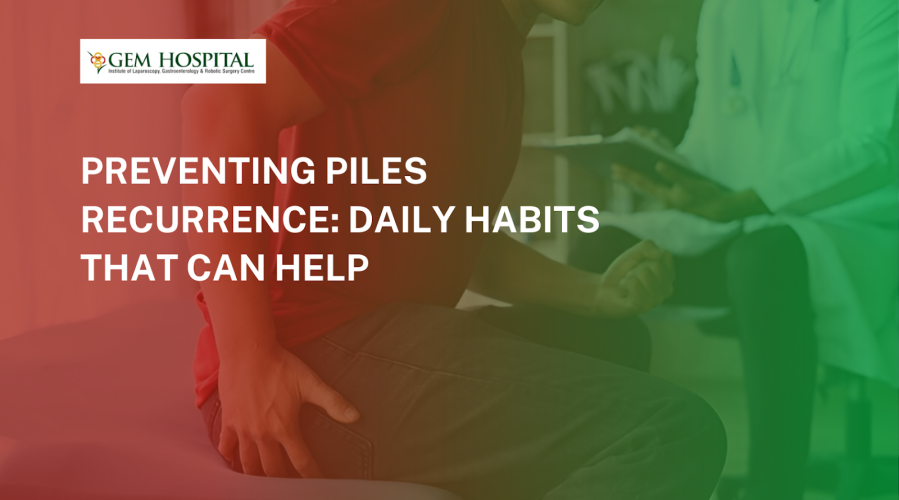Consult experienced hernia doctors in Chennai for expert surgical care. Advanced diagnosis, safe hernia surgery, and faster recovery with specialized treatment.
Preventing Piles Recurrence: Daily Habits That Can Help

Hemorrhoids, or piles, are swollen blood vessels that are in or around the anus or lower rectum, and can be severely painful and uncomfortable. For some individuals, whether you have had piles only once, or you are someone who has frequent pile flares, stopping piles from returning is critical for both your comfort and your health. Piles can develop due to many different causes, such as constipation, prolonged sitting, and poor diet, but daily habits play an important role in having piles not come back. By simply introducing a few healthy habits into your life you can help to lessen the chances of piles returning, and live your life more comfortably.
1. Eat daily high-fiber diet
Constipation can commonly lead to piles, and often when people are constipated, they apply force when they have a bowel movement leading to the swelling of blood vessels that occur in piles. So, it is very important to consume a high-fiber diet daily to help avoid this condition in context with piles. Fiber works to soften stool to promote regularity, thus less force and straining are required. Whole grains, fruits and vegetables, legumes and nuts (all things that should mostly be consumed) are more likely to be high in fiber. Aim for at least 25-30 grams of dietary fiber daily, if possible, also include soluble fiber that absorbs water to soften stool because it is helpful for preventing piles.
2.Remain Seated
To maintain hydration for avoiding constipation and better health, make sure to drink plenty of water throughout the day. When in a dehydrated state, the stool becomes hard and dry--whether as a result of your body being dehydrated or the hard and dry stool itself, hemorrhoids may worsen, or re-accure if they're still present. Try and consume at least 8 glasses (or roughly 2 liters) of fluid every day; of course, when exercising or in hot weather, you will have to drink (or consume) more. Foods that have a high water content, such as cucumbers or watermelon, herbal teas, or other drinks all help to boost your fluid intake.
3. Exercise Frequently
A sedentary lifestyle is one of the main reasons for people getting piles again. The sitting position, especially for long periods of time (such as on the toilet), places strain on the rectal area, which can cause piles to develop or redevelop. To prevent piles, you should be active. Exercise can help improve circulation, reduce constipation, and improve your bowel function. Walking, cycling, or swimming, are all excellent forms of exercise to help the gut and digestive system. Aim for about 30 minutes for 5 or more days a week of moderate level activity.
4. Answer the Call to Defecate Promptly
If you have the urge to defecate, make sure to do it without delay, or ignore that call to attention.When you either put off or neglect bowel movement, you will experience constipation and be more likely to strain. If you do not heed the urge to had a bowel movement, the stool will proceed to harden and get more difficult to pass, increasing the chance you may develop piles. Wherever possible, make every effort not to delay your trips to the bathroom or to not hold your bowel movement.
5.Good Bathroom Habits
Do not strain, or do not spend too long on the toilet. Too much pressure on the veins surrounding the anus and rectum can promote the development of piles. Take the time to sit on the toilet and have a bowel movement. Be careful however; sitting on the toilet too long can actually exacerbate piles. Going to the bathroom in a squatting position is another way to helps relieve strain on your rectum, and took less straining, which causes easier and comfortable bowel movements. If you do agree sitting on the toilet, you could use a foot stool to raise your feet slightly, thus imitating a more enjoyable squatting position.
6.Avoid Lifting Large Things
Heaving large objects, or doing heavy lifting and other strenuous events that put pressure around your core, can contribute to developing piles. Lifting heavy things increases pressure in the lower body, and anecdotally especially your rectal veins. If lifting something heavy, always remember to bend your knees, and try not to overdo it with your lower back or abdominal.If you are lifting something heavy, be sure you are using proper posture; otherwise, ask someone to help you if you do not have to do it yourself.
7. Use OTC Treatments if Necessary
If you know you have piles, or are experiencing symptoms of piles (irritation), you may feel comfortable using an over-the-counter topical treatment (cream or ointment) that provides symptom relief and decreases swelling. Most piles creams contain hydrocortisone or witch hazel, both of which reduce inflammation and itching. However, while these treatments will provide temporary symptom relief, they should be used in combination with the health habits above (i.e. diet, exercise, etc.) to relieve piles once they exist, as well as, prevent further but excess piles symptoms will flaring up in the first place.
8. Practice good hygiene
It is extremely important to keep the anal area clean and dry as much as possible to help prevent piles from becoming a recurrent problem. Instead of using dry toilet paper, consider using, instead, moistened wipes to prevent irritation to the anal area, pat dry after a wash with a towel, in order to keep the area as dry as possible. Many people tend to wipe excessively, which can worsen skin irritation, and if piles already exist, can aggravate the piles even further. You could also consider using warm water while cleaning, washing or consider washing during a bath, as this can relieve a bit of the aggravation on the site of piles, but could also keep the area clean. Also, consider a using a bidet if you have access, so that you don't have any friction associated with toilet paper.
9.Avoid prolonged sitting or standing
Prolonging sitting or standing can increase pressure in the veins around the rectum and anus, also contributing to piles. If your job or lifestyle involves extended periods of sitting, as many office jobs involve, it is important to stand, stretch, or get up walk around every 30 to 60 minutes. If your job involves long periods of standing, change your stance, prop up your leg or sit down to relieve strain whenever possible. Ergonomic furniture or adjustable work chairs can be beneficial and help to prevent piles as well.
10. Check with a doctor for regular reviews
If you have had piles in the past, or you are at risk for some other reason, have regular reviews with your healthcare professional. Your doctor will look at your history and situation and give you some preventative strategies or treatments to avoid them in the future. If you notice bleeding, itching, or pain, see your doctor as soon as possible.
Preventing piles from reoccurring may be as simple as making some changes to your routine. Committing to a high fiber diet, staying well hydrated, exercising regularly and establishing regular toilet habits can all have positive contributions to your overall digest health. With good habits, and looking after your body, you may be able to reduce the chance of developing piles.
If you are concerned about current piles, or have experienced piles before, Gem Hospital has expert consultation and treatment options we can provide, that can either help to manage your piles or prevent piles from reoccurring again. Our general surgeons have experience managing the care you and your symptoms require from our services, if you would like to book an appointment we can discuss your symptoms and we can provide you with advice about treatment. Your health and comfort is important.
Blogs & Article
Get advanced liver transplant treatment in Chennai with expert surgeons, modern technology, and comprehensive care for safe and successful outcomes.
Get advanced piles treatment in Erode with expert doctors. Safe procedures, modern technology, and effective care for fast relief and recovery.


